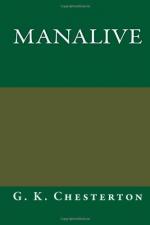“That is so,” said the witness gravely.
“I think,” said Moon, suppressing a slight yawn, “that your Sub-Warden mentioned that Smith was one of the University’s record men for shooting.”
“Why, as to that—” began Pym, after an instant of stillness.
“A second question,” continued Moon, comparatively
curtly.
“You said there were other cases of the accused
trying to kill people.
Why have you not got evidence of them?”
The American planted the points of his fingers on the table again. “In those cases,” he said precisely, “there was no evidence from outsiders, as in the Cambridge case, but only the evidence of the actual victims.”
“Why didn’t you get their evidence?”
“In the case of the actual victims,” said Pym, “there was some difficulty and reluctance, and—”
“Do you mean,” asked Moon, “that none of the actual victims would appear against the prisoner?”
“That would be exaggerative,” began the other.
“A third question,” said Moon, so sharply that every one jumped. “You’ve got the evidence of the Sub-Warden who heard some shots; where’s the evidence of the Warden himself who was shot at? The Warden of Brakespeare lives, a prosperous gentleman.”
“We did ask for a statement from him,” said Pym a little nervously; “but it was so eccentrically expressed that we suppressed it out of deference to an old gentleman whose past services to science have been great.”
Moon leaned forward. “You mean, I suppose,” he said, “that his statement was favourable to the prisoner.”
“It might be understood so,” replied the American doctor; “but, really, it was difficult to understand at all. In fact, we sent it back to him.”
“You have no longer, then, any statement signed by the Warden of Brakespeare.”
“No.”
“I only ask,” said Michael quietly, “because we have. To conclude my case I will ask my junior, Mr. Inglewood, to read a statement of the true story—a statement attested as true by the signature of the Warden himself.”
Arthur Inglewood rose with several papers in his hand, and though he looked somewhat refined and self-effacing, as he always did, the spectators were surprised to feel that his presence was, upon the whole, more efficient and sufficing than his leader’s. He was, in truth, one of those modest men who cannot speak until they are told to speak; and then can speak well. Moon was entirely the opposite. His own impudences amused him in private, but they slightly embarrassed him in public; he felt a fool while he was speaking, whereas Inglewood felt a fool only because he could not speak. The moment he had anything to say he could speak; and the moment he could speak, speaking seemed quite natural. Nothing in this universe seemed quite natural to Michael Moon.




